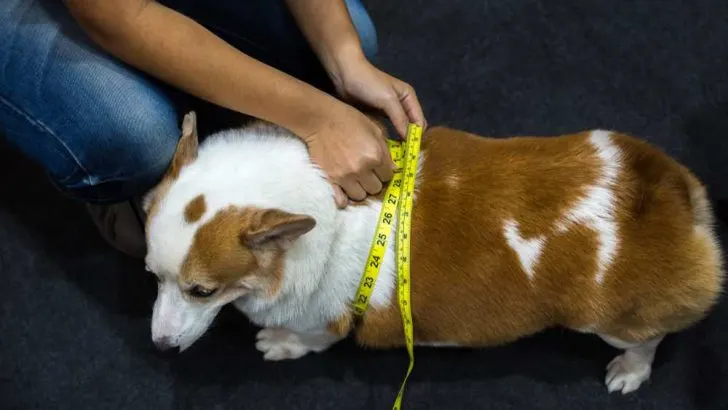A particular trend regarding corgis has been floating around the internet for a while now.
The trend is pushing this very false and unhealthy notion that corgis should be round and chubby, that that’s their natural state and something corgi owners should strive forward.
Well, to prevent you and your corgi from being a victim of this trend, we’ve written an article on why do corgis get fat. We’ll give you all the information you need for keeping your corgi healthy and keep his/her weight on an optimal level.
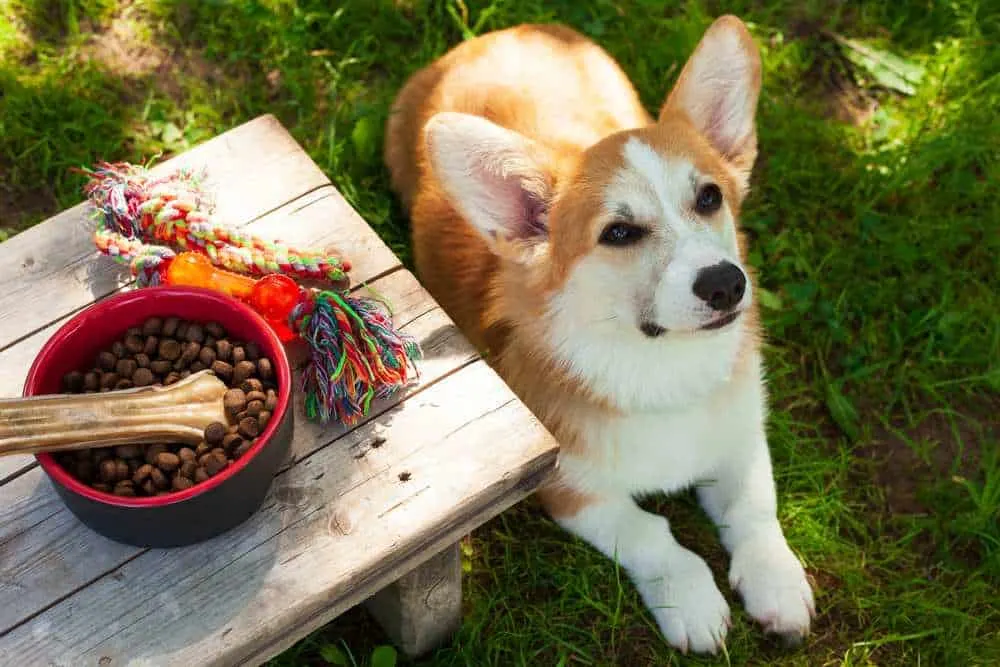
Why Do Corgis Get Fat Easy?
Corgis get fat for the same reason we humans get fat, at least when it comes to physical reasons. As far as we know, they don’t get fat when they break up with someone.
However, keep in mind, dogs are emotional beings highly dependent on their owners.
We won’t list emotional distress as one of the reasons as it isn’t measurable. Still, please make sure your pup gets a proper amount of attention.
Alright, with that out of the way, here are the three most common reasons for corgis getting fat:
Inadequate Diet
Corgis have a voracious appetite. If given an opportunity, they won’t say no to a meal, no matter how big or small it is, or if they’re hungry or not.
Some corgis are an exception to this rule, but they’re not very common.
Owners who aren’t careful with their pet’s diet will get them fat in a relatively short amount of time.
More on how to properly feed your corgi a little later in the article.
Complete Lack Of Exercise
This point can easily go hand in hand with the previous one.
Suppose an owner isn’t careful about their corgi’s diet. In that case, chances are, they’re not into implementing any regular exercise routine either. This is detrimental to a corgi’s health as they require quite a bit of exercise to remain healthy.
Becoming a couch potato is a serious problem for any corgi.
A Health Condition
Finally, we have an undesirable health condition as one of the reasons why a corgi can get fat. There are a few of these conditions characteristic of the corgi breed; we’ll cover the most common ones.
Hip dysplasia is unfortunately common among corgis, as is intervertebral disc disease. Both of these conditions are dangerous and can cause a corgi to put on weight. On the other hand, access weight can also be a trigger for these conditions. So at the end of the day, it is a chicken or the egg problem.
That being said, not letting your corgi become overweight is highly recommended if you want to lower the chances of these conditions developing in your pup.
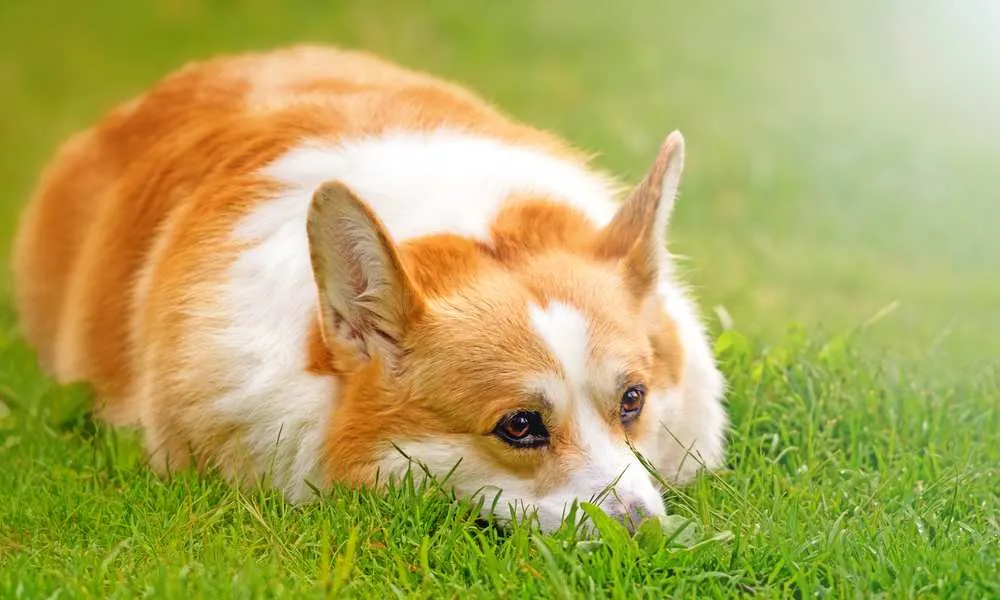
Obesity In Corgis: Signs Your Corgi Is Fat
There are a few things you can do to figure out whether your corgi is fat or not.
We don’t want to offend anyone here by calling their corgi fat; we’re just providing the necessary information that should help in maintaining your corgi’s health.
Visual Test
Take a look at your corgi’s waistline. Does it have a visible abdominal tuck or a lot more “parallel” shape right underneath the ribcage?
Basically, your corgi should have a so-called hourglass figure that implies he is in good physical shape. If it does have a tuck, your corgi is probably not overweight, and you should continue doing what you have been doing so fat.
If, on the other hand, your corgi’s symmetry clearly shows he is overweight, then you should definitely start implementing a healthier and more active lifestyle.
The Rib Test
This a pretty simple test that, that along with the visual one, should help you determine whether or not your corgi is overweight.
Simply count the ribs of your corgi with your hands. You have to feel the ribs in order to make this test valid. There are 9 ribs in total that you would be able to feel.
If you can only feel one or two ribs or none at all, it means you have an overweight corgi. The ribs shouldn’t be hard to feel, you’re not supposed to bury your hand in your corgi’s ribs in order to feel them.
The optimal result would be 6 ribs for most corgis. Anything more than that and your corgi might be underweight, and you should focus on that instead.

Health Risks Of Obesity
There are some serious health risks regarding corgi obesity.
First and foremost, corgis are quite low to the ground, and they have relatively long bodies. Since that’s how they’re built, any excess weight puts quite a bit of strain on their short legs, bones, and joints in general.
In addition, extra poundage puts pressure on their other inner organs as well, which means their heart and lungs can also suffer.
But we won’t go into too much unnecessary detail, instead, we’ll list some other health risks tied to obesity:
- Higher risk of developing diabetes
- Increased blood pressure
- Higher risk of cancer
- Decreased longevity
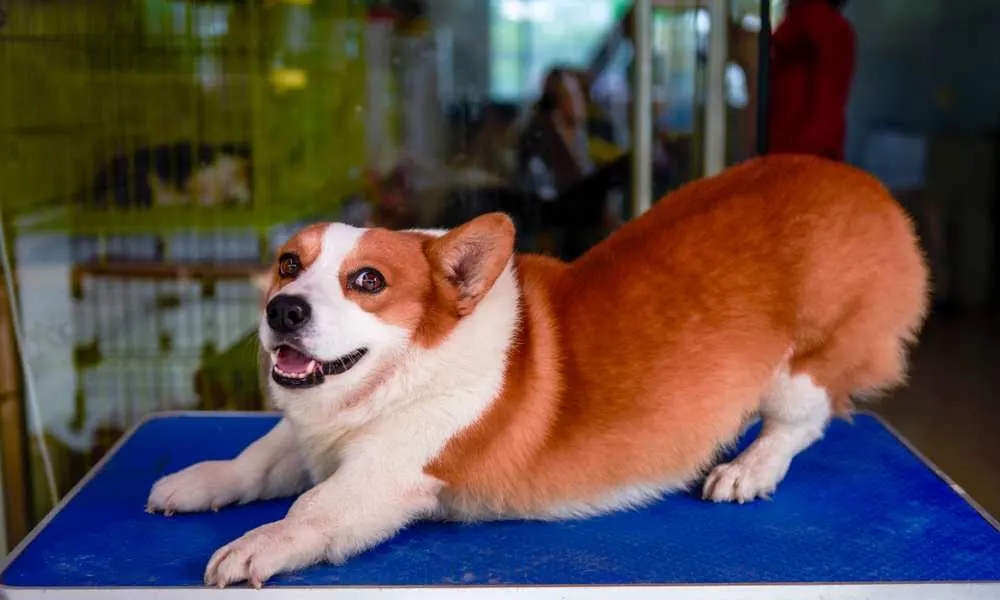
How To Keep Your Corgi From Getting Fat?
Proper diet
First thing’s first. Regulate your corgi’s diet if you want them to remain healthy (and hopefully happy).
This can’t be done through the traditional “two cups of food a day” method. Kibble comes in different varieties. Some are more caloric while others are less caloric, it’s the owner’s job to plan properly.
The nutrition label on the bag should clearly show the amount of calories kibble has. We don’t recommend following the instructions on the bag either. As we said, every corgi has different needs, you could end up overfeeding or starving your dog.
If you’ve determined that your corgi is fat, taking him to a vet to come up with a weight-reduction plan is highly recommended. Some owners might end up hurting their dogs if they don’t know what exactly they’re supposed to be doing.
That being said, there are vets out there who won’t dedicate much attention to a dog that isn’t morbidly obese. In that case, find a vet that wants your corgi to be in top-notch shape and not just “acceptable”. A mandatory part of a corgi’s “diet” journey is a kitchen scale. This will make sticking to a diet plan a lot easier and more reliable.
Proper Exercise Routine
The next thing, just as important as a proper diet, would be a proper exercise routine.
Corgis are herding dogs, this means they were bred for physically (and mentally) demanding tasks. That’s why corgis are so full of energy, it’s in their nature.
It’s no surprise then that corgis forced to be couch potatoes put on weight so easily. Corgis need a daily exercise routine, the more exercise they have, the better as it’s very hard to tire them out.
We’ve written a very extensive article called “How much exercises do corgis need”. We highly recommend you read it as it should provide you with some great exercise ideas and an example routine to serve as a guideline.
Putting It All Together
Alright, now we’ll provide you with a weekly plan, both regarding diet and exercises, that should give you a picture of how a healthy corgi life might look like.
Of course, nothing is set in stone, and you should tweak the plan or make a different one according to your corgi and your own schedule.
| Monday | Tuesday | Wednesday | Thursday | Friday | Saturday | Sunday | |
|---|---|---|---|---|---|---|---|
| 7 am | 1st meal | 1st meal | 1st meal | 1st meal | 1st meal | ||
| 8 am | Quick walk | Quick walk | Quick walk | Quick walk | Quick walk | 1st meal | 1st meal |
| 9 am – 12 pm | Quick walk followed by some heavier exercise (Hiking, swimming, etc,) | Quick walk followed by some heavier exercise (Hiking, swimming, etc,) | |||||
| 1 pm | |||||||
| 2 pm | |||||||
| 3 pm | 2nd meal | 2nd meal | |||||
| 4 pm | 2nd meal | 2nd meal | 2nd meal | 2nd meal | 2nd meal | ||
| 5 pm | Walk | Walk | Walk | Walk | Walk | ||
| 6 pm | Light exercise | Light exercise | Light exercise | Light exercise | Light exercise | Quick walk | Quick walk |
| 7 pm | 3rd meal to compensate for higher energy expenditure | 3rd meal to compensate for higher energy expenditure | |||||
| 8 pm | |||||||
| 9 pm |
This is a very plausible plan for an average dog owner.
Do we think corgis need more exercise than just twice a day? Absolutely, but who has the time to actually pull off such a time-consuming exercise routine.
If you can dedicate enough time for your corgi’s physiological needs on the weekend, it should be enough for him to remain happy and healthy.
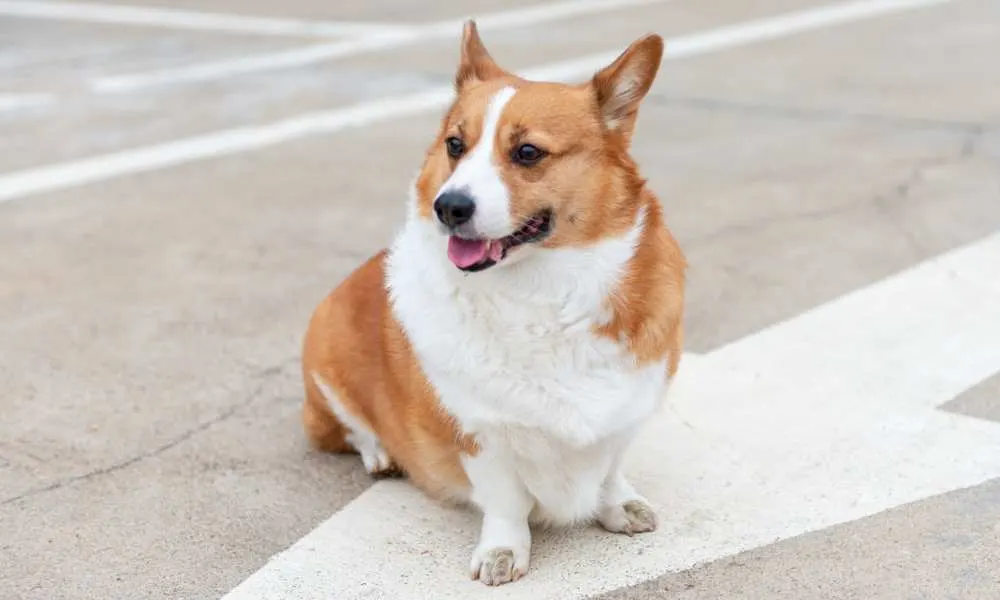
Conclusion
There’s no one-size-fits-all when it comes to weight. Some corgis are bigger and some are smaller.
That’s why we recommend seeing a veterinarian that should help you in figuring out what type of corgi you have and what his or her needs are. As long as you don’t overfeed your corgi and don’t fall for any begging on their parts when it comes to table scraps, their weight should be fine.
Remember, don’t buy into the foolish internet trend that corgis should be pudgy balls of fur. Corgis are great dogs and deserve to be treated with care and affection.
A corgi owner who shows affection by keeping their pet healthy is a lot better than the one who does by keeping them fat.

